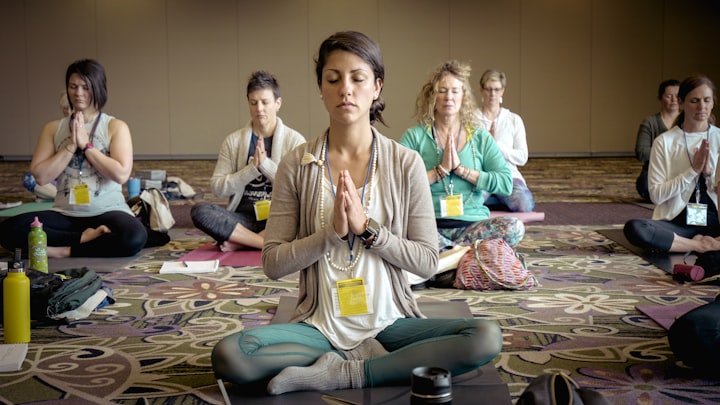The Mind-Body Connection
How Yoga Can Improve Mental Health

Introduction:
In a fast-paced world filled with stress and constant distractions, finding a sense of calm and balance has become paramount for maintaining good mental health. One practice that has stood the test of time and continues to captivate millions is yoga. Beyond its physical benefits, yoga offers a profound connection between the mind and body, unlocking a gateway to enhanced mental well-being. In this article, we will delve into the transformative power of yoga, exploring real-life examples of individuals who have experienced remarkable improvements in their mental health through this ancient practice.
1. The Science behind the Mind-Body Connection:
To comprehend the impact of yoga on mental health, it's crucial to understand the science behind the mind-body connection. Research has shown that the mind and body are intricately linked, and the state of one directly influences the other. Yoga acts as a bridge between the two, integrating physical postures, controlled breathing, and mindfulness techniques to create harmony within the entire being.
Case Study: Sarah's Journey to Inner Peace:
One inspiring story that exemplifies the transformative power of yoga is Sarah's. Sarah had been battling anxiety and stress for years, her mind a whirlwind of worries and negative thoughts. Seeking solace, she turned to yoga. At first, the physical aspect of yoga provided a welcome respite, but it was the mindful breathing and meditation that truly ignited a change within her.
Through consistent practice, Sarah began to develop a deep sense of self-awareness and self-acceptance. She learned to observe her thoughts without judgment, embracing the present moment and letting go of past regrets and future anxieties. As her yoga journey progressed, Sarah noticed a remarkable shift in her mental state. The practice not only helped her manage her anxiety but also instilled a newfound sense of inner peace and resilience.
2. The Release of Emotional Baggage:
Yoga serves as a conduit for emotional release, allowing individuals to tap into and release pent-up emotions that may have been suppressed for years. It offers a safe space for individuals to confront their emotional struggles head-on and work through them on the mat.
Case Study: Mark's Healing Journey:
Mark, a combat veteran who suffered from post-traumatic stress disorder (PTSD), discovered the healing power of yoga. For years, he carried the weight of his traumatic experiences, unable to find peace within himself. Through yoga, Mark began to unravel the layers of emotional trauma. With every breath, he let go of the pain and fear that had gripped him for so long.
The combination of movement, breathing, and mindfulness enabled Mark to reconnect with his body and release the emotional baggage he had been carrying. As he continued his yoga practice, Mark experienced a significant reduction in his PTSD symptoms, regaining control over his thoughts and finding a renewed sense of purpose and joy.
3. Cultivating Resilience and Self-Compassion:
Yoga cultivates resilience by teaching individuals to embrace discomfort and find strength in challenging moments. Through the practice of asanas (physical postures) that push our limits, we learn to breathe through difficulty and build mental fortitude.
Case Study: Emily's Empowerment:
Emily's journey exemplifies the transformative power of yoga in building resilience. After a painful divorce, she found herself grappling with self-doubt and a loss of self-esteem. Yoga became her sanctuary—a space where she confronted her limitations and learned to push past them.
With every asana, Emily discovered her inner strength and resilience, realizing that she was capable of far more than she had ever imagined. As her confidence grew, she applied the lessons learned on the mat to her everyday life, developing a newfound belief in herself and her abilities.
Cultivating self-compassion is another significant aspect of yoga. Through gentle movements
and mindfulness, individuals learn to treat themselves with kindness and embrace their imperfections. This self-compassion, in turn, fosters a healthier mindset and improved mental well-being.
Conclusion:
The mind-body connection is a profound phenomenon, and yoga serves as a powerful tool to harness its potential. Through real-life examples, we have witnessed the transformative impact of yoga on mental health. It allows individuals to release emotional baggage, cultivate resilience, and practice self-compassion.
If you find yourself yearning for balance and inner peace, consider incorporating yoga into your life. Explore the various styles and practices available, and embrace the journey that awaits you. Allow yoga to be your guide, as it has been for countless others, on a path towards improved mental well-being and a harmonious mind-body connection. Remember, the power to heal and transform lies within you—start your yoga practice today and embark on a journey to a healthier and happier you.
About the Creator
McQueen Matt
Introducing a captivating story or article that hooks readers from the very first line is crucial to pique their curiosity and compel them to read further in a world flooded with information.






Comments
There are no comments for this story
Be the first to respond and start the conversation.